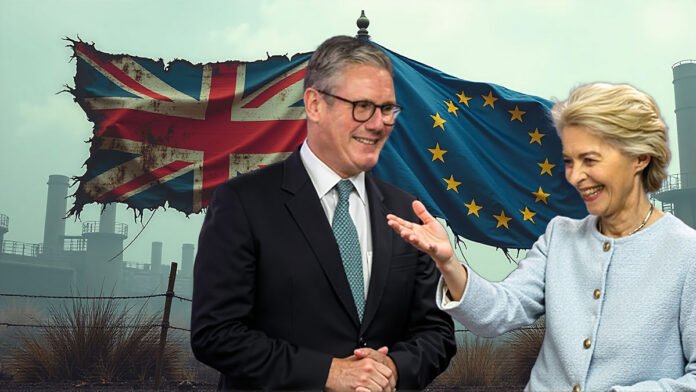Starmer’s EU Crawl: How Political Class Failed Britain Before Brexit and Will Fail Again
The Neoliberal Reset…
As Sir Keir Starmer’s negotiators burn the midnight oil ahead of his grand EU love-in with Ursula von der Leyen and Antonio Costa, it’s worth remembering one simple truth: the political class that impoverished Britain within the EU is the same political class now desperate to drag us back into its orbit.
This isn’t about Brexit versus Remain anymore. It’s about a fundamental failure of Britain’s political establishment, regardless of Party badge, to serve the interests of ordinary people while blaming others for their own catastrophic policies.
The Midnight Surrender
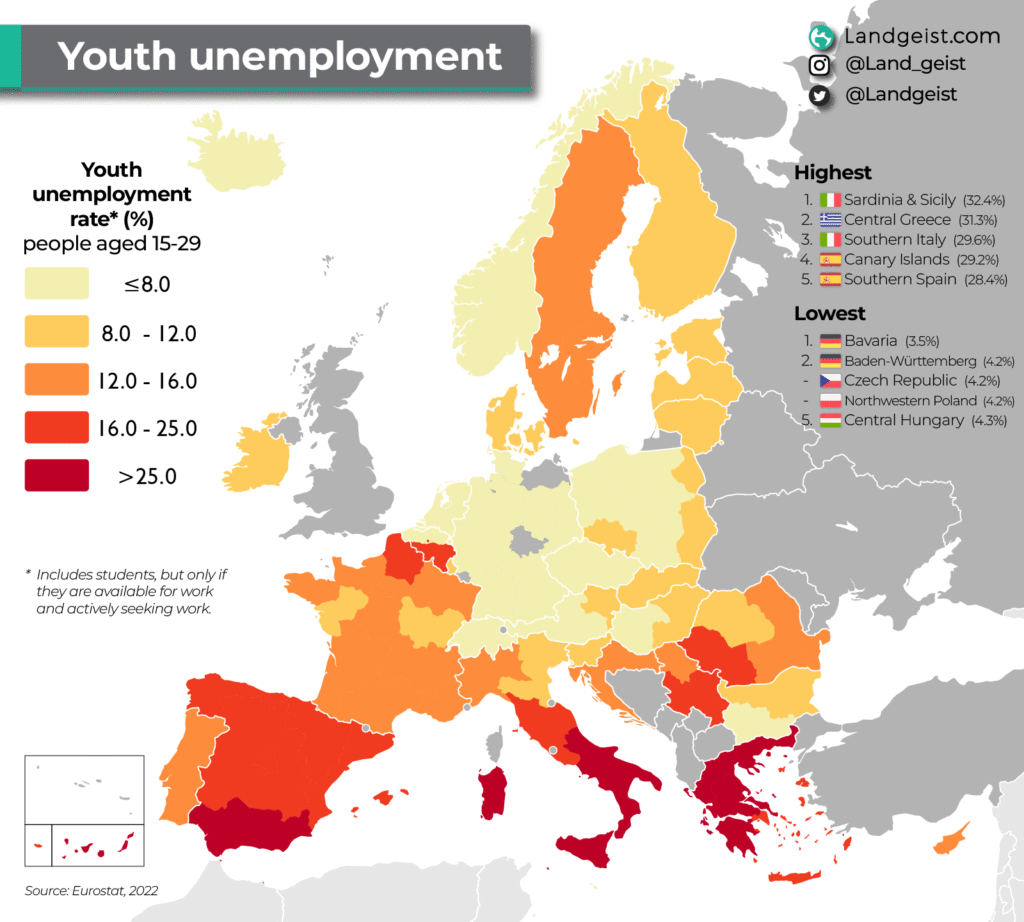
British and European negotiators are working through the night to finalise Starmer’s “reset” deal before Monday’s carefully choreographed press conference with European Commission President von der Leyen and European Council President Costa. Downing Street’s spin machine is already in overdrive, speaking of “outstanding issues on both sides” as if this were a negotiation between equals rather than a crawl back to Brussels on bended knee.
At the heart of these talks is a youth mobility scheme, allegedly similar to arrangements with Canada and South Korea. Labour ministers are already gaslighting the public: “As of today we have already 13 youth mobility schemes with other countries, nobody is remotely suggesting that is freedom of movement with those countries, it absolutely isn’t.”
This disingenuous comparison ignores the obvious: Canada isn’t a 21-mile ferry crossing away. Spain’s youth unemployment rate stands at a staggering 26.6%, compared to the EU average of 14.5%. This isn’t youth mobility, it’s an economic pressure release valve for the EU’s struggling economies, allowing them to export their unemployed youth to Britain’s already stretched job market.
The Great British Impoverishment
The political establishment’s amnesia about the EU’s role in Britain’s regional inequality is nothing short of breathtaking. Since the UK joined the EU, GDP per capita in areas that ultimately voted Leave declined year after year. These regions, once the powerhouses of British industry, became some of the poorest in Northern Europe under EU membership.
This isn’t speculation; it’s statistical fact. Nine UK regions rank among the ten most deprived areas in Northern Europe. West Wales, Durham and Tees Valley, South Yorkshire, and Northern Ireland, all hollowed out while politicians in Westminster and Brussels celebrated the EU’s “economic miracle.”
The charts don’t lie. They’re the EU’s own statistics. And they tell a story not just of Britain failing within the EU, but of Britain’s political class failing its people, a failure that continues today as Starmer prepares his surrender to Brussels.
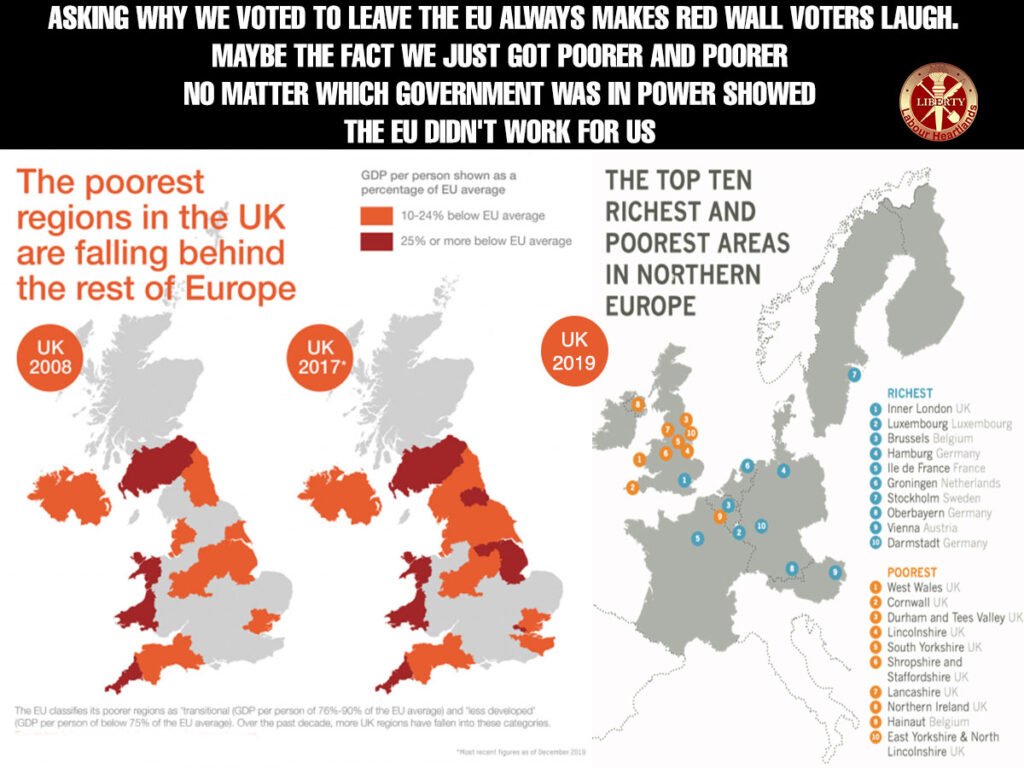
Inner London stands alone as the richest area in Northern Europe, but this only underscores the catastrophic inequality that festered during our EU membership. The gap between Britain’s richest and poorest regions in terms of disposable income became the widest in the EU, a damning indictment of how membership benefited the few at the expense of the many.
By 2018, while Britain remained shackled to the EU, UN Special Rapporteur Philip Alston delivered a verdict that should have shaken our political class to its core. After a 12-day fact-finding mission across the UK, he described what he found in one word: “Misery.” Despite being one of the world’s wealthiest nations, the UK had 1.5 million people experiencing destitution and “staggering” levels of child poverty.
The government, then Tory, now Labour, dismissed his findings, claiming household incomes were rising. The same political class, the same disconnection from reality, the same contempt for those left behind.
The Neoliberal Consensus
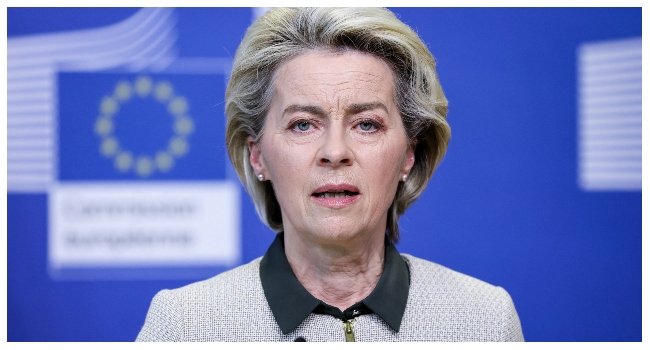
By 2021, another UN Special Rapporteur, Olivier De Schutter, went further, stating that the EU’s own neoliberal policies were driving poverty across the continent. This shouldn’t surprise anyone, 14 million people in the UK were living in poverty while we remained EU members.
The EU was never designed as a worker’s paradise. It was constructed as a neoliberal project to facilitate the free movement of capital, standardise deregulation, and create a continent-wide market where corporations could operate with minimal democratic oversight. Its core four freedoms, goods, capital, services, and people, were always meant to serve business interests first and foremost.
Freedom of movement, that sacred cow of urban liberals, brought added competition to already deindustrialised towns. Locals with limited opportunities and training suddenly found themselves competing against better-qualified EU workers for an ever-shrinking number of jobs, while politicians from both parties sneered at them as backwards and xenophobic for daring to complain.
The cruel irony is that at the exact moment Starmer wants to flood the job market with young EU workers, his government is also shoving disabled Britons off benefits and into that same job market. It’s a double whammy of neoliberal cruelty: importing cheaper labour while forcing society’s most vulnerable to compete for increasingly scarce positions.
Disabled people already face discrimination and barriers in employment. Now they’ll compete not just against other Britons, but against young, able-bodied Europeans willing to work for lower wages and in worse conditions. Meanwhile, Labour slashes PIP benefits by £4,500 a year for hundreds of thousands of families, effectively telling disabled people: compete with foreign workers or starve. This isn’t progressive politics; it’s class warfare with an EU flag pinned to it.
The Democracy Deficit
The truth is the EU never worked for the working class. It pushed down wages while exploiting foreign workers, becoming nothing more than a reserve army of labour and a feeding trough for big business. The last true socialist Labour leaders understood this. Michael Foot, whose principled opposition to the European project echoed the concerns of millions of working-class Britons, warned us what was at stake:
“People didn’t fight for the vote just to have the fun of electioneering,” Foot argued. “They wanted to see that the vote that they used and the Ballot Box could change things, stop things, alter things, remove governments when necessary. That’s one of the principal reasons for having a vote, but that’s not going to happen if we stay in the market, if we become enmeshed in the whole of their machinery and apparatus, because what will happen then is that you can go and have an election in this country, in which we vote out the government here, but you won’t be voting out all the governments that meet in Brussels to decide what’s going to happen to us!”
Tony Benn, another giant of genuine Labour socialism, was equally clear-eyed: “When I saw how the European Union was developing, it was very obvious what they had in mind was not democratic. In Britain, you vote for a government so the government has to listen to you, and if you don’t like it you can change it.”
This fundamental principle that power should reside with the people who must live under its exercise was at the heart of the Brexit vote. It’s why two-thirds of Labour MPs represent constituencies that voted to leave. It’s why communities devastated by decades of deindustrialisation and neglect seized their chance to be heard. And it’s precisely what Starmer, in his midnight negotiations with Brussels, is working to undermine
Politicians Failed Britain
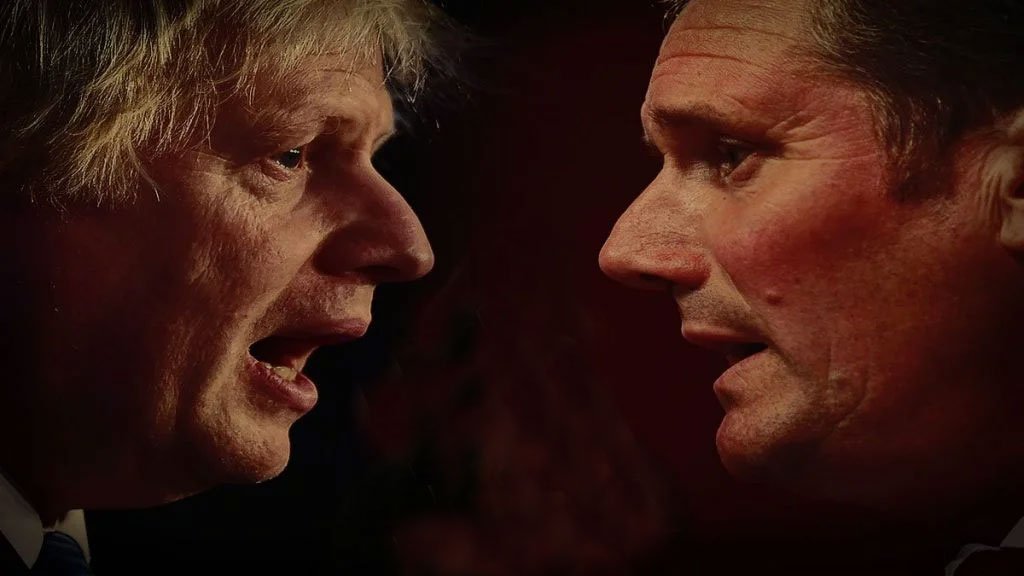
The fundamental truth that neither Starmer nor the Conservatives will admit is this: Britain’s problems weren’t caused by joining or leaving the EU. They were caused by decades of catastrophic policy failures by a political class that abandoned industrial communities, embraced financialization, and prioritised London’s interests above all else.
Margaret Thatcher began the destruction of British industry, but New Labour continued it with enthusiasm, replacing manufacturing jobs with precarious service work while celebrating the City of London’s casino capitalism as economic progress. The Conservatives then imposed austerity that gutted what remained of the public sector safety net.
The political establishment, of which Starmer is very much a part, used the EU as a convenient scapegoat for their own failures. Now they’re using Brexit as an excuse for continued economic malaise, rather than addressing the structural problems they created.
As one Sunderland car worker memorably put it after being told GDP would fall if Britain left the EU: “Whose GDP?” That question cuts to the heart of Britain’s dysfunction, a system that measures success by metrics that have no meaning for millions of people struggling to survive.
The Alternative Path
There is no compelling economic argument for creeping back toward EU membership. But there is a very strong case for building a new economic model: One rooted in industrial revival, regional investment, and policies that put British workers first.
Instead of midnight negotiations with Brussels, Starmer should be developing an industrial strategy that rebuilds the manufacturing base destroyed by his predecessors. Instead of youth mobility schemes, he should be investing in training and apprenticeships for British youth left behind by decades of educational inequality.
The British people didn’t vote for Brexit because they hated Europe. They voted for it because they hated what had been done to their communities while politicians in Westminster and Brussels looked the other way.
Starmer’s EU reset isn’t about serving those communities, it’s about serving the same establishment interests that failed Britain before Brexit and will fail Britain after his “reset” is complete.
Support Independent Journalism Today
Our unwavering dedication is to provide you with unbiased news, diverse perspectives, and insightful opinions. We're on a mission to ensure that those in positions of power are held accountable for their actions, but we can't do it alone. Labour Heartlands is primarily funded by me, Paul Knaggs, and by the generous contributions of readers like you. Your donations keep us going and help us uphold the principles of independent journalism. Join us in our quest for truth, transparency, and accountability – donate today and be a part of our mission!
Like everyone else, we're facing challenges, and we need your help to stay online and continue providing crucial journalism. Every contribution, no matter how small, goes a long way in helping us thrive. By becoming one of our donors, you become a vital part of our mission to uncover the truth and uphold the values of democracy.
While we maintain our independence from political affiliations, we stand united against corruption, injustice, and the erosion of free speech, truth, and democracy. We believe in the power of accurate information in a democracy, and we consider facts non-negotiable.
Your support, no matter the amount, can make a significant impact. Together, we can make a difference and continue our journey toward a more informed and just society.
Thank you for supporting Labour Heartlands
